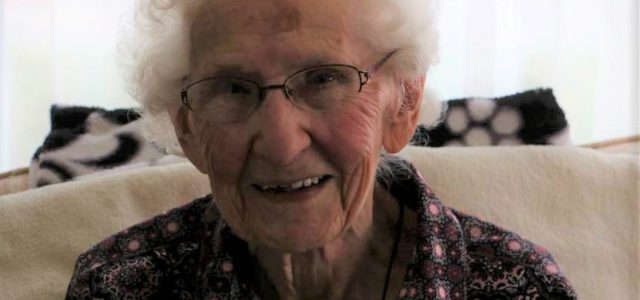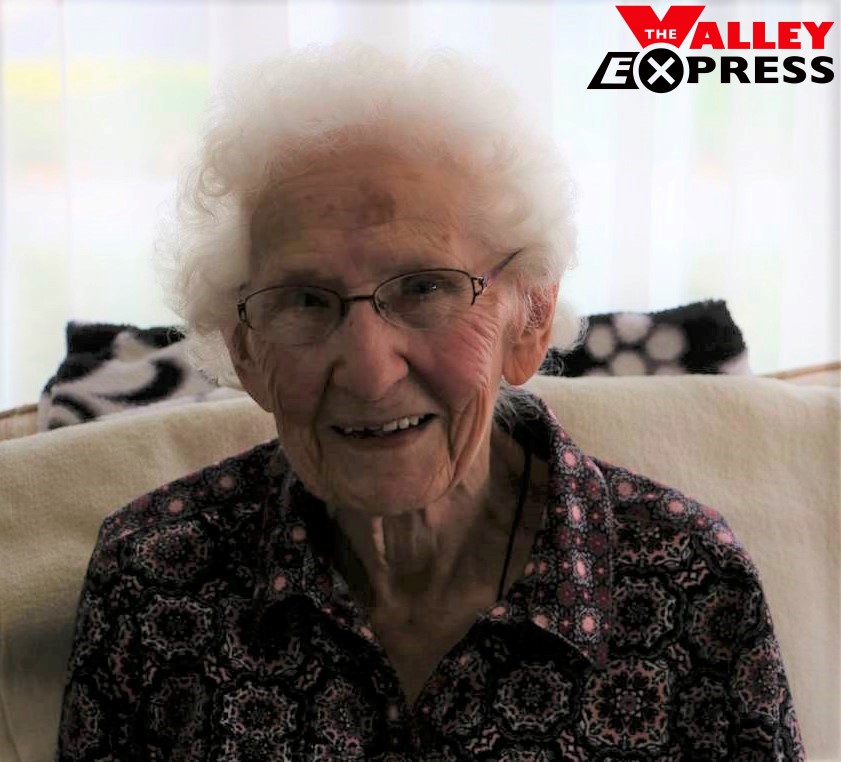

Lucille Hublou was one of the first babies born in the original St. Bernard’s Hospital in Milbank. She arrived in Grant County on August 19, 1921, to Mr. and Mrs. Oscar Manning. She grew up thinking Milbank was a pretty nice place to live and decided to stay — 100 years.
Her father was a farmer, and she will spend her 100th birthday on that same farm nine miles southwest of Milbank. Her niece, the daughter of her late brother George, lives there now, and the family plans to host a picnic in Lucille’s honor. Although, if you ask Lucille, she’ll deny it’s a birthday party or a special day.
Lucille attended country school in Madison Township and Milbank High School. The country school was rescued by the Grant County Historical Society and is now part of their museum. Lucille says, “The school is also special to me because my mother was a teacher there before she was married.”
“We didn’t come to Milbank very often when I was young, but we would meet for Sunday school every week in the little school house. We didn’t have music for our hymns, but eventually we obtained an organ.”
“A man raised watermelons, trucked them to Milbank, and sold them. He donated the money to buy us a pedal organ. That schoolhouse holds lots of memories for me.”
But all of those memories have to squeeze in to find a place among 10 decades of other memories. She’s as sharp as a new penny, and has no problem recalling them, but she’s just as likely to pepper the conversation with comments about Zoom, the riots in Minneapolis, and how businesses are struggling now to find workers.
Some memories, of course, stand out more than others. Pearl Harbor is one. She says, “I remember I was with my friends and they were wondering where they would go to be soldiers. That was an important day.”
She also recalls the hardscrabble life of the Dirty Thirties. “We lived through the drought and, of course, we were very poor. It was such a tough time. We didn’t have feed for the cows we milked or corn to feed the pigs. In the summer, we would herd the cows into the ditches of the road so they could eat the grass growing there.” She says.” These memories stick with you and when you are alone you reminisce. I miss having my family to talk about it with them.”
Lucille says Covid has been scary for her. “The only thing I remember like this was polio. Polio didn’t shut the world down like Covid.”
“ We took my daughter Alice to the doctor when she was eight months old because I thought she might have polio. The doctor ruled it out, and said, ‘If she had it, she wouldn’t be able to turn her head to look at me. She is fine.” (A stiff neck was one of the symptoms of polio.) Lucille continues, “We took her home and then one day her leg was sticking out while she was sitting in her high chair. So, we took her back to the doctor and she had polio.”
“Parents hated summer because polio breakouts were worse in the summer,” she says. “Many people got it. Our minister Pastor Gugin at the Methodist Church lost his six year old. I had two other children at the time, and they didn’ get it.”
She says, “I remember the first polio vaccine, too. It was a sugar cube with the medicine on the sugar cube. The public went to the city auditorium by the courthouse on Main Street. That’s how we got our first dose.”
The memory leads her to recall when she was young and everyone had to go upstairs to the doctor or dentist on Main Street. She says, “That was before they turned the old Odd Fellows Hall into a clinic across from the City Aud by the courthouse.”
Now, she has her medicine — just one pill a day — and her groceries delivered. She says she doesn’t see and hear as well as she used to, but remarks, “ Last evening I looked out and the sun looked round and completely red. It looked round like the moon. That was the one thing in the sky. There was something in the air, but I didn’t smell any smoke from the fires, so I’m not sure what it was.”
“ I find it interesting to observe things, “she explains. “The sun showed up on the carpet so red. That’s what caught my attention.”
It probably stood out so much because her carpet was immaculate. But it isn’t just the floor that’s clean, her entire house is neat as a pin and she does all the housekeeping herself. “Well,” she whispered conspiratorially, “my son Alan comes to vacuum once a week.” Then, she giggles and says, “I give him ice tea, a sandwich, and a cookie.”
“Living on my own,” she adds, “ isn’t much work because I have laundry facilities right in my apartment. Some people have to take their clothes to a laundromat. I am fortunate.”
But it wasn’t always that easy. “The old way we had to wash clothes was… Well, it was labor,“ she says. “We carried the soft water and put it in a wash boiler on the stove and heated that water up to boiling. Then, we carried it out to the machine. After we were done washing, we carried the water out because we didn’t have a drain. We poured it on the ground. It was lots of lifting. Pails of water are heavy!”
After her twins were born, she purchased a clothes dryer. She says, “I had never even heard of diapers like you can buy now. I had to wash them. I was a stay at home mom, but if you had a job, I can’t imagine how you could do it”. She also loves having a microwave. “It’s so handy. And, the food you can buy now is amazing, too.”
She likes everything.and eats anything. But she really loves apples and applesauce. She’s also quite fond of fresh asparagus.
She says, “I don’t order pizza for myself, but when my family comes, they get a bunch of pizzas and we sit around and eat it together. I like that, too. There’s so many things you can put on it.”
She chastises herself a bit for not eating as much fish as she thinks she should. She is a South Dakota girl. “My main meal has always been meat and potatoes,” she says.
Although she has lived in town for many years, she still has a hankering for fresh tomatoes from the vine. Luckily, her genes include her father’s green thumb and she has a tomato plant on her patio. She says, “I have picked lots of tomatoes already. My geraniums have been doing really well this year, too. I was afraid it was too hot and too windy earlier this year. I notice now the days are getting shorter. That happens when school starts.”
She laughs when she recalls her 60th birthday. “My five children would tell you I didn’t want to turn 60. I thought it was a downer.” She laughs again at the irony of it. “Oh, but I have had a wonderful life,” she says. “I’ve been very fortunate. I really feel I have been blessed.”
She says, “I learn something new every day, and when I was 60, I learned to drive. My mother drove but I didn’t.”
She gets up every day at 6 a.m. and does her work, so she has some time in the afternoon to read and do word searches. As for TV, she has the news channel on but because she doesn’t hear well, she doesn’t watch a lot of TV. She says, “The news about Afghanistan made me blue on Sunday. We have been there a long time –20 years”
She recognizes the world is different today and cites professional sports in particular. In reference to players who require interpreters during interviews, she says, “Can you imagine working with people you can’t talk to? Being sociable is one of the better things to help you handle yourself.”
She says,” I wonder if they really need a translator? Or is it they don’t know how to express themselves?” She says she enjoys interacting with her neighbors. Then she tosses in, “Who came up with that idea of kneeling anyway?”
Kneeling must remind her of being married to a Catholic, but Lucille has been a member of the Parkview United Methodist Church for 75 years.
In 1946, she attended the Methodist church that was located on the corner of Main Street and Hwy 12 — the current site of the Wells Fargo Bank. Both of her parents’ funerals were conducted there, and her sister Lois married Alfred Pay in that church. She also had two other sisters Marcella Johnson and Betty Nelson.
She says she is so excited to visit her family’s farmstead again on Saturday. ”It’s where my brother and I hunted gophers and herded cattle. We walked across the field to see our cousins.”
“They’ve torn down the barn and several of the buildings, but I knew every step of that section. I’ve been gone a long time, though. I have been gone a very long time. But, the land doesn’t change. The creek is still there.”
“It will most likely be dry this year,” she predicts. ”It always was unless we got a heavy rain.” Some things never change.
.













No comments so far.
Be first to leave comment below.